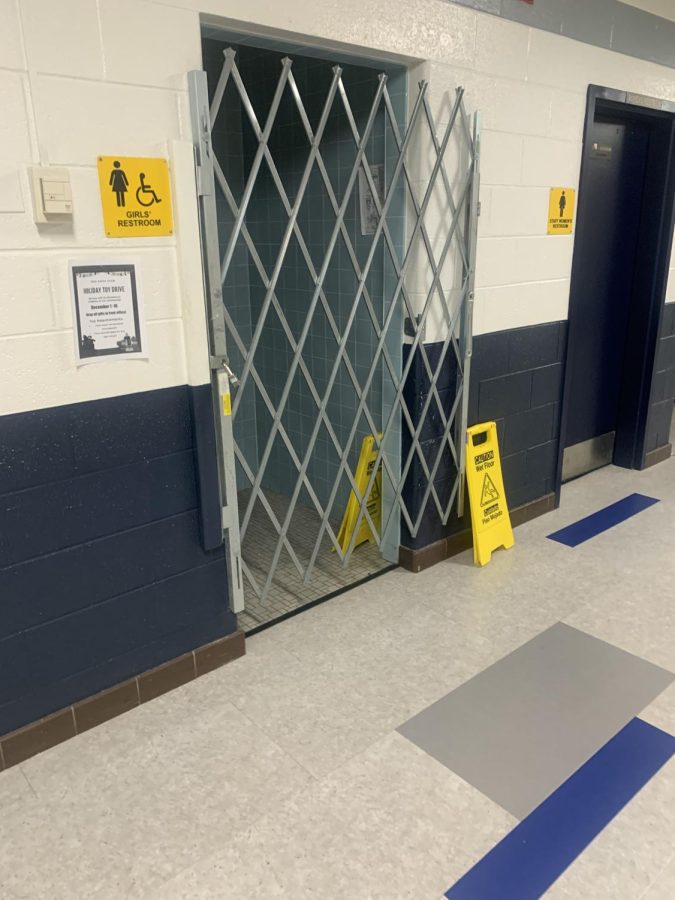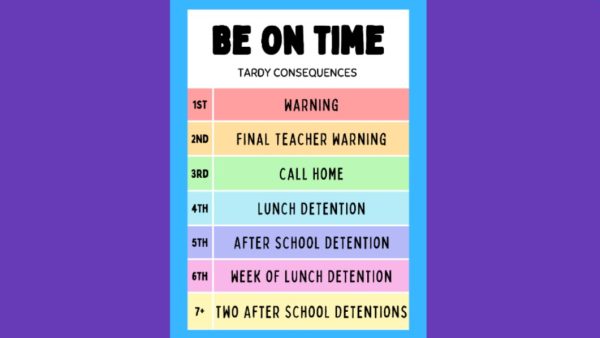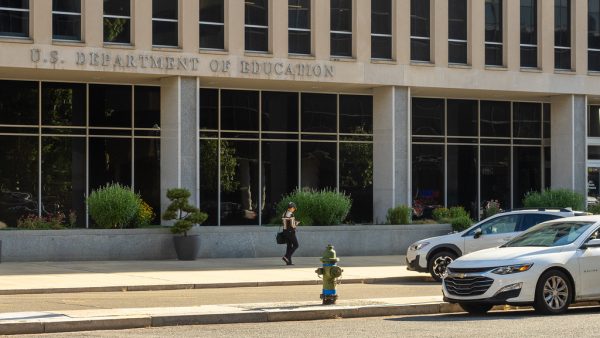Bathroom Loitering Results In Sometimes-Locked Doors and New Guidelines
This year, a new restroom rule was added in place to help students focus on their learning; but; some students think that it may be too harsh as it may lead to negative repercussions.
This policy involves locking a majority of restrooms during the time students may not use the restroom. It builds on the previous rule from last year dictating that students may not use the restroom during the first 15 minutes and last 15 minutes of each class. Like last year, this new addition to the bathroom policy has received mixed feedback.
An example of this new rule being beneficial is when a student attempts to wander the halls with a “bathroom pass” at the end of a period. With this rule active, they would not be able to wander the halls and disrupt both their own and other students’ learning.
“[The restroom policy] has definitely been helpful though there are still crowded restrooms at times. Generally, I believe it is with good reason and has been successful so far. As a result, there have been noticeably fewer students in the hallways during class as well,” said teacher Andrew Harington.
The new bathroom rule is useful; although, not all students are on board with the new addition of locking the majority of restrooms. Some bathrooms may be locked for longer than the first 15 minutes and the last 15 minutes of each class period.
“I think that the school has gone too far. Again, people can’t use the bathroom when they need to, and it feels very restrictive that every corner to turn to, there are ‘bars’ blocking your way,” said senior Ghazal Habib. “If students really want [to skip in the restroom,] I say just let them. It’s going to affect their grades and their attendance and their lives. It really isn’t something that a school tries so hard to implement to the point that it affects other students that are doing what they are supposed to do.”
Senior Jorge Castillo recounted when he was affected by the bathroom locking.
“One time, I was going to use the bathroom at the west wing and both of the bathrooms were closed. I had to go all the way to the Common area to use that bathroom. It was quite the journey,” said senior Castillo.
Harington believes that the restroom rule is the best course of action Osbourn can take when combating the “concern of fights” and “excessive numbers of students in the bathrooms.”
“I do agree with the action taken by the school and I don’t know if there is a better way to handle this course of action,” said Harrington. “If students have something to say on the matter or have suggestions though, I’m more than willing to listen. However, there would still need to be some sort of restriction in place.”
Though the restroom rule is the best course of action Osbourn can take, there is still room for improvement.
“The only thing that might be an improvement is reducing the amount of time the restrooms are locked from 15 minutes at the start and end of each class to 10 minutes. I’ve had some students that miss an opportunity to stop by the restroom between classes and at times 15 minutes is too long to wait. The best steps to take are to evaluate the overall effectiveness of bathroom locking to this point and craft a plan moving forward of how to implement a change like reducing how long the bathrooms are locked,” said Harington.
However, there is an argument that the policy of locking restrooms should be changed entirely.
“Students should be able to go use the restroom if they need it, and if students are residing in the restroom, there should be some type of surveillance of the bathrooms,” said Castillo. “[More] bathrooms should be open … all of the time. The reason for this is that this will give students an option to use the bathroom if they need to and it will be easy to monitor (with surveillance) a few bathrooms instead of all of them.
Habib agrees that the restroom policy should be changed entirely.
“I think that restroom locking should be changed because you can’t really create a time of when you need to go. It’s wasting student time and taking time away from learning. It’s also very bad for mental health because they are treating students almost like prisoners,” said Habib.
Not only is the locking of the restrooms an issue for students, but for all staff at OHS.
“As a teacher who has a classroom directly next to student bathrooms, I can assure you that the stricter policies are a very good idea. I totally sympathize with students who just want to quickly use the restroom and get back to class. But some days, my actual classes are disrupted by large groups of students socializing and listening to loud music in the bathrooms, and I have to either clear out the crowd myself or call security to help me. We sometimes have to redo voiceover and video work in my broadcast journalism class because of the disruptions. It is usually the same students hanging out in the bathrooms every day, but the issue is definitely real,” said journalism teacher Ms. Lisa Miller.
“I have so many things to say about this issue as a security staff member dealing with this all during the school day. This is a really big issue. It’s not ok to be hanging in the bathrooms during class periods. It should get reported to the office at all times, no matter the case. Lots of the security staff and teachers here at OHS get frustrated having to deal with this nonsense every single day. It is a big issue that has to be dealt with sooner or later, and hopefully, students will learn to mature and better themselves,” said security team member Ms. Karen Aguilar.
Do you have thoughts on the bathroom loitering issue? Tell us in the comments!

My name is Radwan Khan, and I am a senior.
This will be my second year on Talon as an editor and writer. I look forward to writing articles about current...












C • Feb 17, 2023 at 8:42 am
you right you right
Alondra Marquez • Dec 16, 2022 at 9:31 am
I understand that locking up the bathrooms happened with great intentions however I feel that there could be another way to go on about this problem because there are students who really just want to use the bathroom and nothing more. Waiting 15 minutes seems a bit much maybe they can bring it down a couple minutes. The quotes were amazing it was a great idea to get the teachers point of view on things !
amelia breeden • Dec 15, 2022 at 12:43 pm
I am glad that an article was made about this issue and that we were able to see two sides to the story. These quotes were great as well and I agree with the fact that I feel there should be something else to handle this situation, because of how hard it is to use the restroom nowadays. I hope that this article can be seen by some staff cause it has a lot of great inputs to take into consideration.
Madina Habib • Dec 15, 2022 at 12:39 pm
I completetly agree with the fact that they shoudl change their policy. It really makes no sense to punish the people doing no wrong who are just using the bathroom. If students choose to skip its only affecting them in the long run
Ms. Burroughs • Dec 15, 2022 at 12:06 pm
It’s really sad when my students have to miss more instruction because of having to go find a bathroom that is open. It’s frustrating as a teacher trying to strike a balance between two evils. Having to break up a group of people in the bathroom has become an every day occurrence and it shouldn’t be part of my job to do this.